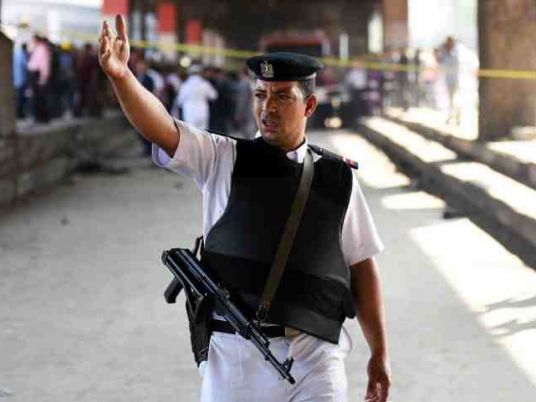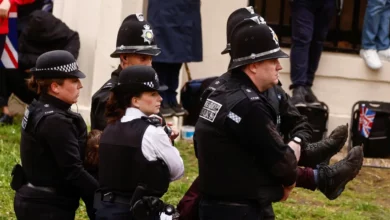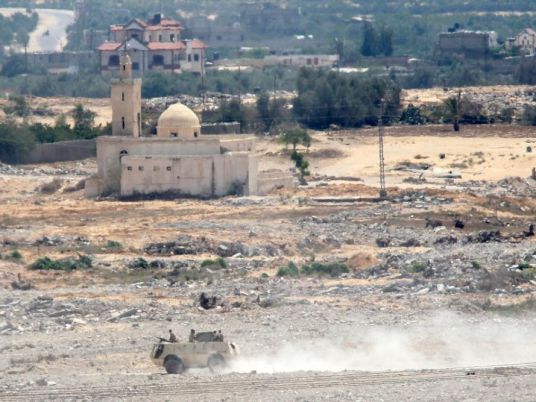A few years ago, I visited the Stasi Museum in Berlin. I had learned about the East German security apparatus from a film that depicted the extent of its social control during the 1980s. After 1989, the Stasi was duly dismantled and their headquarters was turned into a museum. As I wandered its hallways and offices, I learned about how the Stasi’s system of intimidation and torture worked.
As an Egyptian, I didn’t need to be reminded of the cruelties of excessive security powers. We had our own Stasi in Egypt, known as the State Security Investigations (SSI) apparatus, disbanded just last week.
In the Stasi Museum, I remember imagining a similar fate for the SSI under whose grip we were forced to live in Mubarak’s Egypt. Under the guise of the Emergency Law and “national security”, countless men and women were intimidated, detained without charge, tortured, and even killed by the SSI since its formation in 1952.
Our media, education, and religious convictions were all dictated by the SSI, which hand-picked the heads of state television, newspapers, public universities, large mosques, and syndicates. After a thorough screening process, anyone suspected of excessive piety, ties to the opposition or simple eccentricity was immediately refused.
It was all too common for ex-SSI heads to move on to higher official positions. Habib al-Adly, the previous Interior Minister (now accused of over 500 counts of murder and instigating chaos by ordering the withdrawal of the entire police force on 28 January) was an ex-SSI head. He was promoted to minister in 1997 after the terrorist attacks in Luxor, even though he headed the very agency responsible for preventing such attacks.
With the fall of Mubarak and the slow disintegration of his regime, the SSI found themselves without a corrupt, all-powerful entity to pledge their loyalty to, and more importantly, to seek immunity within. Nervous about the threat of impending charges for their past abuses, SSI members seem to have largely gone underground.
Being the all-knowing apparatus it is, the SSI probably knew any efforts to counter the revolution and restore the previous status quo would not help them escape prosecution. And so in the six weeks between the security pull-out and the decision to disband the institution, the SSI set out to burn the paper trail that would incriminate its officers in cases of illegal information gathering, incarceration, torture and vote-rigging.
Some people have also accused the SSI of provoking the recent sectarian clashes in Cairo, masterminding random acts of thug-related violence and even collaborating with the army in detaining and torturing civilians.
Our newly-appointed interim Prime Minister, Essam Sharaf, has found himself with the unenviable task of reforming the main agency responsible for the perpetuation of the old regime. And so Sharaf appointed Maj. Gen. Mansour al-Eissawy, a ministry veteran who did not serve during al-Adly’s 13-year tenure.
Many police reform experts believe that the hasty dismantling of a police apparatus can lead to increasing social instability. According to Ink Spots, a blog that specializes in discussions on security issues, “sacking the police and starting over usually fails.”
Meanwhile, Alexander Joffe, an anthropologist at Penn State University, writes that “in most cases of peaceful transition, intelligence agencies have generally been treated as an inescapable liability and have acted as impediments to the development of democracy, either formally within the government, or informally from outside.”
The path chosen by General al-Eissawy to reform the SSI suggests he is familiar with Joffe’s conclusions. Al-Essawy's restructuring process has largely been a game of musical chairs, where some officers have been given forced leave, others have been moved to different departments within the Interior Ministry, while a new National Security Agency has been newly established to absorb the remaining ex-SSI officers and take up duties that deal with internal securities.
So is SSI merely being re-branded as NSA?
Until now, the answer is yes. Al-Essawy had told the press this new security body “will only monitor terrorist threats and threats to national security, without impeding citizens’ lives.” Thus, Egypt’s notorious security apparatus may follow the path of the Soviet KGB, rather than the East German Stasi.
Unlike the Stasi that was effectively dismantled, the sprawling KGB underwent a cosmetic name change after the fall of the Soviet Union. It was first broken up into five agencies, one of which became the Russian Federation’s internal security agency, the FSK – Federal Counterintelligence Service. Under ex-Russian President Boris Yeltsin, the FSK was merged with other KGB spin-offs to become the ever stronger FSV – Federal Security Service. This was done under the pretext of confronting the rising threat of Chechen terrorism.
There are however cases of genuine security reform — in Chile, Indonesia, East Germany, and, to an extent, South Africa. But success takes time, an engaged public and a real democratic process that upholds human rights. Of course there are no prototypes. The Truth and Reconciliation Commissions that may have worked in South Africa, might not work in Egypt where the SSI has operated largely in contravention of Egyptian laws. Following East Germany's example, granting victims and researchers access to security files kept hidden from the public may help ease the pain of families who don’t know why and how their loved ones disappeared.
Most importantly, Egypt’s new and reformed security agencies must be under organized judicial, parliamentary and ministerial supervision. That’s the only way to ensure the security apparatus’ subordination to the will of the people. Without commissioners appointed to monitor human rights, legal compliance and budgetary transparency, the newly founded NSA might just as well be a reincarnated SSI.
Only by keeping up public pressure for transparency and civilian oversight, will we be able to relegate the brutal legacy of the old regime to the insides of display cases, and get our own SSI Museum.
Yahia Shawkat is an architect and heritage planner with the Tarek Waly Center, Architecture & Heritage.




